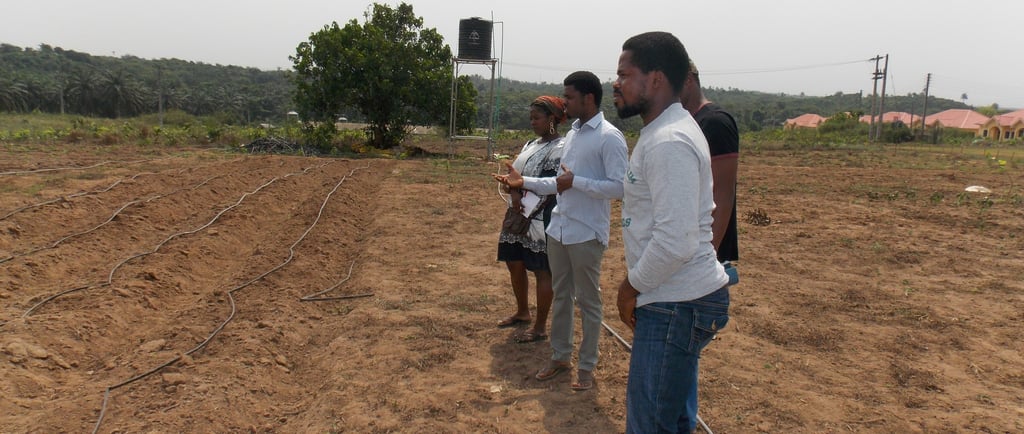The yet to be found Heroes of Food Security: Why Farm Assessors, Auditors, and Inspectors are Crucial to West Africa’s Agricultural and Industrial Growth
The Importance of Farm Auditors, Inspectors and Assessors in the development of Agriculture, Industries Exports and the economy
Lawal Abdulrahman Temitope
9/14/20244 min lire
In West Africa, agriculture is the backbone of the economy, feeding millions, creating jobs, and generating substantial income. Yet, the very foundation of this vital sector is at risk due to widespread neglect of one of its most essential pillars: farm assessors, auditors, and inspectors. The work they do ensures that food production, animal welfare, and land management meet standards that protect both the consumer and the environment.
Despite their critical role, these professionals often go unnoticed. This article will explore why farm assessors, auditors, and inspectors should be at the forefront of any conversation on agricultural development in emerging economies—and why their absence could be a ticking time bomb for food security in West Africa.
The Hidden Crisis: Why Quality Control in Agriculture is ignored
Agriculture in West Africa is rife with challenges of poor infrastructure, outdated farming techniques, climate change, and inconsistent access to modern technology. Yet, there is one crisis that has gone largely unnoticed—the lack of consistent and effective farm assessment, auditing, and inspection.
Why is this a problem? Simply put, without these essential quality control measures, the entire food supply chain is vulnerable. Farm assessors, auditors, and inspectors ensure that farms are compliant with national and international standards for food safety, environmental sustainability, and worker welfare. Their absence allows for unsafe practices, environmental degradation, and poor-quality products that could cripple the region's agricultural future.
Who Are Farm Assessors, Auditors, and Inspectors?
Farm assessors evaluate agricultural lands, looking at the conditions of the soil, water availability, and farming methods to ensure they meet sustainability and productivity standards. Auditors focus on the internal processes of farms and agricultural businesses, ensuring compliance with both legal and market requirements. Inspectors are more involved in the verification process, checking that farms adhere to health, safety, and quality guidelines.
In regions like Europe and North America, these roles are highly valued and regulate, it forms the foundation for data management and Industrial supply of Agricultural raw materials. But in West Africa, they are often sidelined, underfunded, or even non-existent in Some Countries. This oversight has catastrophic implications for food quality, international trade, and the health of local economies.
5 reasons why West Africa Needs to Prioritize These Roles in Agriculture and Food Security
1. Food Safety and Public Health
A lack of stringent inspection and auditing opens the floodgates for contaminated food products to reach local and international markets. This has led to a number of undocumented public health crises such as Bioaccumulation of toxic chemicals, food poisoning, foodborne illnesses which has led to a number of rejections in International trade. Farm inspectors ensure that crops are free from harmful pesticides, bacteria, or any other contaminants that could endanger public health right from the farm production systems before, during and after sales from farms. Currently, there are a number of social media post pointing at dangerous use of agrochemicals, unhygienic practices in retail markets providing evidences to the dangers in all of these.
2. Boosting International Trade
Emerging economies like those in West Africa depend heavily on agricultural exports, yet they often face barriers when entering international markets. One major reason? Non-compliance with global agricultural standards. Without rigorous farm audits and inspections, West African produce often fails to meet the necessary benchmarks for export, leading to rejected shipments and economic losses. Strengthening the role of auditors can help bridge this gap. Many times, the lack of knowledge in the documentation process leads to unverifiable claims even when it commodities exported were in good conditions
3. Environmental Protection
The unchecked use of land for agriculture often leads to deforestation, soil degradation, and water pollution—environmental disasters that exacerbate the impact of climate change in West Africa. Farm assessors help monitor land use and ensure sustainable farming practices that protect the environment for future generations. Their work is vital for maintaining soil fertility, preventing over farming, and ensuring water resources are used efficiently.
4. Worker Welfare and Ethical Farming
The agricultural sector in West Africa is notorious for its poor labor conditions. Many workers are underpaid, overworked, and lack access to basic safety equipment. Inspectors can enforce labor laws, ensuring that workers are treated fairly and farms operate ethically. Ignoring this could lead to human rights abuses, which would tarnish the region’s global reputation and hinder foreign investment.
5. Combating Corruption in the Agricultural Sector:
The agricultural sector is not immune to corruption. Whether it’s bribing officials to bypass inspections or falsifying reports, these unethical practices undermine food safety and environmental protections. Independent auditors and inspectors act as gatekeepers, ensuring that corruption does not compromise the integrity of the food supply chain. There has to be a face and name to successes when domestic or international trade succeeds or fails. When rejections happen, who bares the cost of rejection? Always the producer even when they are said to have pass government regulation.
A Controversial Debate: Are Local Farmers Ready for Stricter Regulation?
While the importance of farm assessors, auditors, and inspectors is clear, implementing these roles at scale in West Africa raises a controversial question: Are local farmers ready for stricter regulation?
Many smallholder farmers, who make up the majority of agricultural producers in the region, argue that the cost of compliance with stringent farming standards could push them out of business. They lack the financial resources to meet international benchmarks, and without government support, they are vulnerable to penalties, rejected crops, and loss of income.
However, failing to implement these roles can lead to far worse consequences. A collapse in food quality, environmental destruction, and deteriorating working conditions could devastate the region’s agricultural sector in the long term.
The Way Forward!
West Africa’s agricultural future hinges on the often-overlooked roles of farm assessors, auditors, and inspectors. Their work is critical to ensuring food safety, environmental sustainability, and ethical labor practices. For too long, these professionals have been underfunded, underappreciated, and overlooked—yet they hold the key to unlocking the region’s full agricultural potential.
For West Africa to truly thrive in a globalized world, governments, businesses, and international organizations must invest in these roles. They must support farmers with the resources and education needed to meet the necessary standards. Only then can the region’s agricultural sector flourish sustainably, ensuring food security and economic prosperity for all.
To be a Domestic or regional Farm Auditor, Assessor and Inspector with one of the most reputable organization in Good Agricultural Practices worldwide in West Africa. Follow the link to get trained and build a career in Farm Auditing, Assessments and Inspection!


